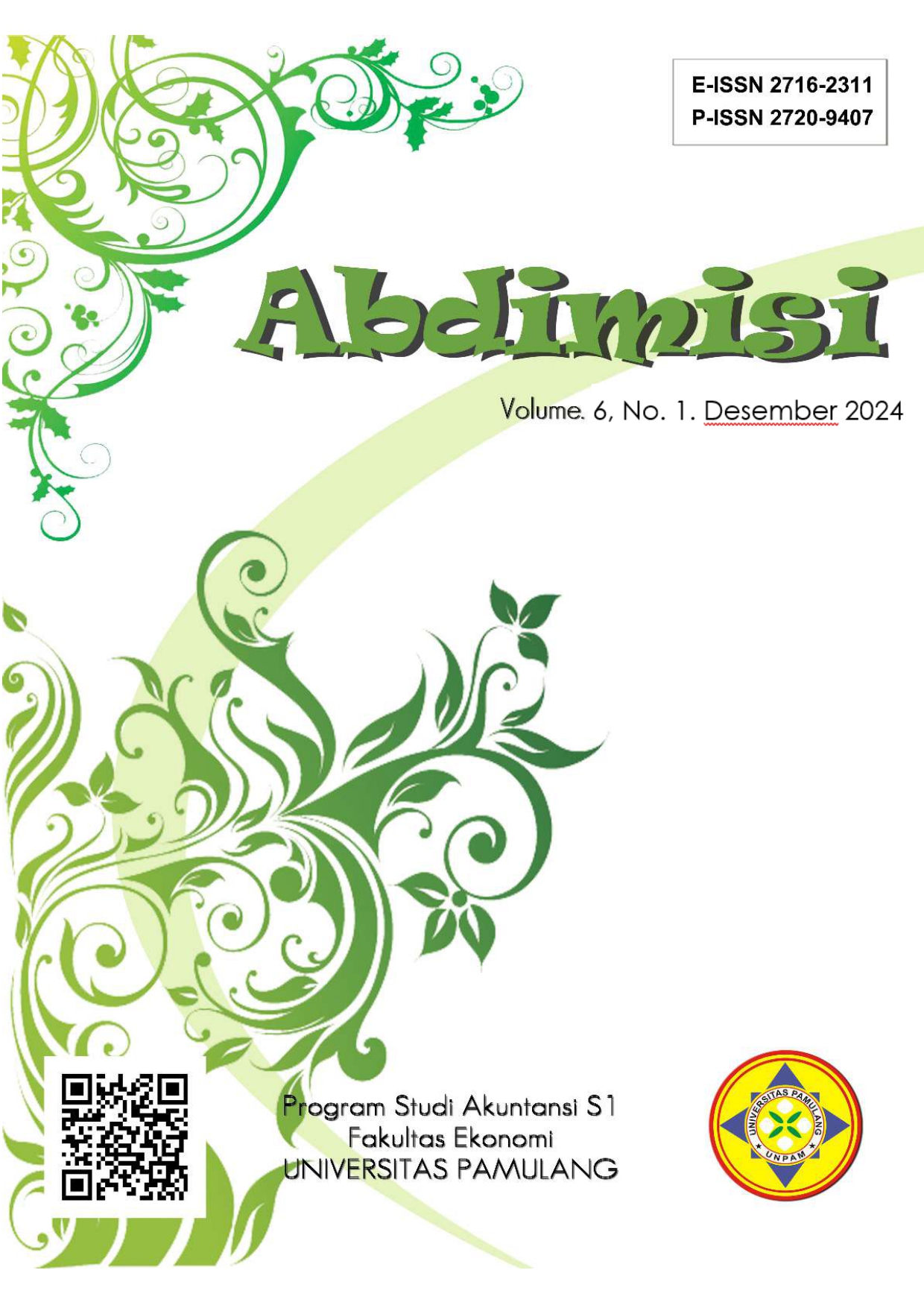Pemanfaatan Aplikasi Akuntansi Berbasis Android Dalam Pembukuan Akuntansi Sederhana UMKM
Pada Anggota Gerakan Kewirausahaan Nasional (GKN) Indonesia Provinsi Jawa Tengah
DOI:
https://doi.org/10.32493/abms.v6i1.47478Abstract
Kegiatan Pengabdian Kepada Masyarakat (PKM) ini bekerja sama dengan Gerakan Kewirausahaan Nasional Indonesia (GKN) Jawa Tengah untuk membekali pelaku UMKM dengan prinsip-prinsip akuntansi, guna meningkatkan usaha dan kesejahteraan mereka. Permasalahan utama yang dihadapi adalah pencampuran keuangan bisnis dan pribadi serta minimnya pemahaman tentang penyusunan laporan keuangan. Hal ini mengakibatkan kesalahan dalam pencatatan biaya produksi dan laba usaha, yang memengaruhi pengambilan keputusan. Dalam kegiatan ini, peserta merupakan kelompok wirausaha semarang yang tergabung dalam Gerakan Kewirausahaan Nasional Indonesia. Para wirausaha tersebut diperkenalkan pada prinsip kesatuan usaha untuk memisahkan pencatatan pribadi dan bisnis, serta penyusunan laporan keuangan sederhana sesuai standar akuntansi. Peserta juga diberikan penjelasan tentang komponen laporan keuangan seperti pendapatan, beban, aset, utang, dan modal dan mengunakan aplikasi SIAPIK.
References
Christmastuti, A. A. et al. (2019) ‘Accounting Software For Msmes : Organizational And Personal Factors Based On Tam Theory’, 19(1), pp. 1–7.
Endrianto, W. (2015) ‘Prinsip keadilan dalam pajak atas umkm’, 6(9), pp. 298–308. Handayani, Puspita, Syarifudin Syarifudin dan Nurhayati. (2022). ' Pemanfaatan Aplikasi Akuntansi Berbasis Android
Dalam Pembukuan Sederhana UMKM (Pada Anggota UMKM Pondok Petir Sejahtera)', JMM-Jurnal Masyarakat Merdeka, 5 (1), pp. 35-42. Kemenkop UKM. (2022). Laporan Tahunan
UMKM 2022.
Mahrus, M. L., Almadia, F. and Jelita, N. B. (2020) ‘Keberlanjutan : Jurnal Manajemen dan Jurnal Akuntansi’, 5(2), pp. 131–141.
Muljanto (2020) ‘Pencatatan dan Pembukuan Via Aplikasi Akuntansi UMKM di Sidoarjo’, 6(1).
Putra, R. A., et al. (2021). "Literasi Akuntansi dan Implikasinya terhadap Pengelolaan Keuangan UMKM." Jurnal Akuntansi Bisnis, 10(1), 123-134.
Rohmah, L. (2020). "Peran Laporan Keuangan dalam Akses Pendanaan UMKM." Jurnal Ekonomi dan Keuangan Mikro, 8(3), 65-78.
Sinarwati, N. K. (2017) ‘Sistem informasi akuntansi berbasis mobile bagi umkm’, pp. 44–49.
Susanto, H., & Wibowo, R. (2021). "Implementasi Teknologi untuk
Mendukung Pengelolaan Keuangan UMKM." Jurnal Inovasi Teknologi Bisnis, 9(4), 34-50.
Wijaya, D. P., et al. (2021). "Efektivitas Pelatihan Teknologi Keuangan bagi UMKM." Jurnal Pemberdayaan Komunitas, 6(2), 89-97.
Downloads
Published
Issue
Section
License
Copyright (c) 2025 Puspita Handayani, Ayumi Rahma, Fina Ratnasari, Zico Alamsyah

This work is licensed under a Creative Commons Attribution-ShareAlike 4.0 International License.
Copyright Notice
Authors who publish with this journal agree to the following terms:
- Authors retain copyright and grant the journal right of first publication with the work simultaneously licensed under a Creative Commons Attribution License that allows others to share the work with an acknowledgement of the work's authorship and initial publication in this journal.
- Authors are able to enter into separate, additional contractual arrangements for the non-exclusive distribution of the journal's published version of the work (e.g., post it to an institutional repository or publish it in a book), with an acknowledgement of its initial publication in this journal.
- Authors are permitted and encouraged to post their work online (e.g., in institutional repositories or on their website) prior to and during the submission process, as it can lead to productive exchanges, as well as earlier and greater citation of published work (See The Effect of Open Access).
Abdimisi have CC-BY-SA or an equivalent license as the optimal license for the publication, distribution, use, and reuse of scholarly work.
In developing strategy and setting priorities, Abdimisi recognize that free access is better than priced access, libre access is better than free access, and libre under CC-BY-SA or the equivalent is better than libre under more restrictive open licenses. We should achieve what we can when we can. We should not delay achieving free in order to achieve libre, and we should not stop with free when we can achieve libre.
You are free to:
- Share — copy and redistribute the material in any medium or format
- Adapt — remix, transform, and build upon the material for any purpose, even commercially.
- The licensor cannot revoke these freedoms as long as you follow the license terms.

